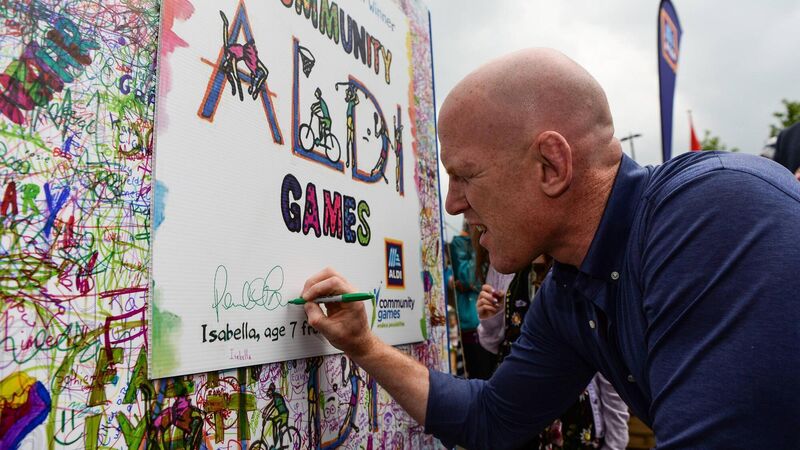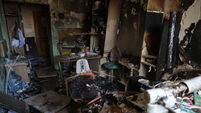Fergus Finlay: Everyone who takes part in the Community Games grows stronger

Paul O'Connell signs the Aldi Doodle wall during day 1 of the Aldi Community Games in 2018.
Despite the public address announcements elsewhere at the track, it was really tense and quiet beside the throwing area. We were there for Katie (she’s my granddaughter), and we were all nervous. And the heat! The hottest place in Ireland over the last two days was Carlow, and that’s where we were. It was beating down, and it affected everyone.
It was the national finals of the Community Games, held in the quite magnificent athletics facility attached to the South East Technical University. Several thousand youngsters were there, representing their families and their counties. It was a classic track and field setup with the full range of competition from under 8 boys and girls to under 16s.
And then there was the ball throw competition, for boys and girls. Katie was there, in the national finals, because she had accidentally picked up a sliotar a couple of months earlier and thrown it. Thrown it so far that, when she entered the Wicklow community games, she became Wicklow champion. Out of nowhere.
I have my own theory that she has developed a strong right arm because she’s also a wonderful dancer and had spent months practicing and perfecting a one-armed cartwheel. (She’s my granddaughter, you know.) Whatever, she had earned the right to represent the whole of Wicklow in a sport she had never heard of a couple of months ago.
As it happened, she didn’t have a great day in the office at the finals, and she was upset by that. But Katie (have I mentioned she’s my granddaughter?) went home as one of the best ball throwers in her age group in the entire country. She might have been upset, but her family couldn’t have been prouder (especially her Grandad, who has never represented his county or his country at anything!).
It also gave us a reason to be there. I haven’t been at a community games event for years. I knew the man who founded Community Games, Joe Connolly, quite well. He was a lifelong Labour man, with one simple idea — to create an opportunity for children and young people to get involved in sport and other activities in all the ways that suited them best.
The Community Games is more than half a century old now, and still going from strength to strength. It has distinguished alumni — Sonia O’Sullivan, Paul O’Connell, and John Treacy all took their first competitive steps under its banner. Even Colin Farrell and Saoirse Ronan have Community Games memories.
Everyone who takes part — every single youngster — grows a little because of the Games. That’s because each year it brings out the potential in thousands of Irish kids. It has maintained both an incredibly strong local community spirit and a vibrant national sense.
Ask anyone in Ireland where they’re from and they’ll instinctively name a town or county. Bandon, Kilkenny, Wexford, Castlebar. Sometimes if they’re from Dublin they’ll make a slight distinction. If someone tells you they’re “from the north side”, you never need to ask, “the north side of where?”. (Mind you I’ve never heard anyone announce that they’re from the south side. I must investigate that sometime.) I wonder if that sense of really belonging somewhere, of having deep and strong roots, is as true anywhere else in the world. What I do know is that we’re lucky to have it.
There was a time when people like me used to say things like “when you’re as old as I am, you’ll have lived through a few hard times”. But the hard times just keep rolling now, don’t they?
So Katie is eleven. She’ll be disgusted at me for saying it, but she’s still a kid. And in her short life, starting with the year she was born, an Irish government resigned in disgrace and the political system was sent into a spin from which it has never recovered. The country had witnessed months of political mismanagement and chaos and had lost its sovereignty, all of its key economic decisions having to be approved by a troika of foreign institutions.
In that year a new government came into being, and it worked incredibly hard to win back the nation’s sovereignty. When Katie was 4 that government paid a terrible price for some of the decisions it had to make, and in some quarters hasn’t been forgiven yet. Somehow or other, we managed nevertheless to pull ourselves out of a terrible quagmire of debt and stagnation and reassert ourselves as people worth believing in.
We were barely back on our feet, and Katie was just 8, when the pandemic arrived. We suffered as other countries did, and lost citizens we shouldn’t have lost. There was huge pain and loneliness, and a lot of trauma for different generations, throughout the pandemic and especially in its first year.
But when the history of that period is written it will be clear that national solidarity was the key factor in minimising death and in pulling us through. That national solidarity marked us apart from many countries where the outcomes were multiple times worse.
And of course, no sooner were we beginning to feel that the worst was over when the carnage of Putin’s invasion of Ukraine was visited on the world.
I’ve been reading a report called “Sign of the Times”, an annual look at how we’re doing produced by the Behaviour and Attitudes company. A lot of it is about brands and commercial issues, as you’d expect but it’s a clever amalgam of what the Census tells us and what their own polling tells us.
Sign of the Times says that the pandemic experience has taught us a lot about ourselves. Not just what’s really important to us and what we need most to thrive — it’s also forced us to think about the parts of our lives that weren’t adding any value.
And it says we surprised ourselves with the strength we were able to muster, and the ingenuity we displayed in adapting to different ways of life.
One of their key findings is about what they call lasting resilience in the Irish. We’re as open to trying new things, and we feel as positive about better days and achievements ahead as we ever did. And that’s despite how much we have been battered — and recovered from the battering — in the last ten years.
Katie’s generation, the one growing now, will need that resilience more than any previous one. We’re years away from cracking the crisis in housing and the daunting challenges facing education and health. Above and beyond that, only an idiot would deny the reality of climate change and the looming burdens it will impose on the future.
That’s the lasting legacy we’re going to leave for Katie and her generation. In my eyes, we’re lucky about one thing. They may be the best generation we’ve ever produced.














